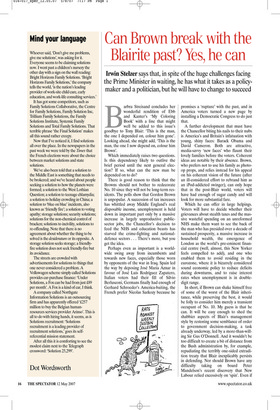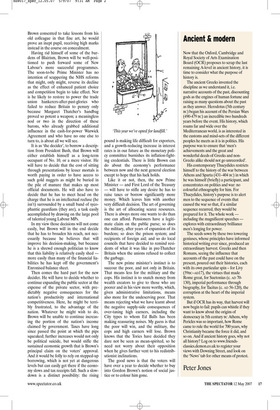Can Brown break with the Blairite past? Yes, he can
Irwin Stelzer says that, in spite of the huge challenges facing the Prime Minister in waiting, he has what it takes as a policymaker and a politician, but he will have to change to succeed Barbra Streisand concludes her wonderful rendition of Ebb and Kanter’s ‘My Coloring Book’ with a line that might well be added to this issue’s goodbye to Tony Blair: ‘This is the man, the one I depended on, colour him gone’. Looking ahead, she might add, ‘This is the man, the one I now depend on, colour him Brown’.
Which immediately raises two questions. Is this dependency likely to outlive the brief period until the next general election? If so, what can the new man be depended on to do?
There is good reason to think that the Browns should not bother to redecorate No. 10 since they will not be long-term residents. The polls show that Gordon Brown is unpopular. A succession of tax increases has whittled away Middle England’s real disposable income, unemployment is held down in important part only by a massive increase in largely unproductive publicsector jobs, the Chancellor’s decision to feed the NHS and education beasts has starved the crime-fighting and nationaldefence sectors ... There’s more, but you get the idea.
Perhaps even as important is a worldwide swing away from incumbents and towards new faces, especially those worn by opponents of the war in Iraq. Spain led the way by deposing José Maria Aznar in favour of José Luis Rodríguez Zapatero, Italian voters had their fill of Silvio Berlusconi, Germans finally had enough of Gerhard Schroeder’s America-baiting, the French prefer Nicolas Sarkozy because he promises a ‘rupture’ with the past, and in America voters turned a new page by installing a Democratic Congress to do just that.
A further development that must have the Chancellor biting his nails to their nubs is America’s and Britain’s infatuation with young, shiny faces: Barack Obama and David Cameron. Both are attractive, media-savvy ‘new faces’ who flaunt their lovely families before the voters. Coherent ideas are notable by their absence. Brown, who prefers not to use his family as photoop props, and relies instead for his appeal on his coherent vision of the future (after an ill-considered effort to rebrand him as an iPod-addicted swinger), can only hope that in the post-Blair world, voters will have had enough of sugar candy and will look for more substantial fare.
Which he can offer in large helpings. Voters will have to decide whether their grievances about stealth taxes and the massive wasteful spending on an unreformed NHS make them want to see the back of the man who has presided over a decade of sustained prosperity, a massive increase in household wealth, the emergence of London as the world’s pre-eminent financial centre (well, almost, this New Yorker feels compelled to add), and one who enabled them to avoid residing in the eurozone, where it is bizarrely considered sound economic policy to reduce deficits during downturns, and to raise interest rates when unemployment is in doubledigit range.
In short, if Brown can shake himself free of some of the worst of the Blair inheritance, while preserving the best, it would be folly to consider him merely a transient occupant of No. 10. My guess is that he can. It will be easy enough to shed the shabbier aspects of Blair’s management style by restoring some semblance of order to government decision-making, a task already underway, led by a more-than-willing Sir Gus O’Donnell. And it wouldn’t be too difficult to create a bit of distance from the Bush administration by, for example, repudiating the terribly one-sided extradition treaty that Blair inexplicably persists in defending. Nor should Brown have any difficulty taking on board Peter Mandelson’s recent discovery that New Labour relied excessively on ‘spin’. Even if Brown consented to take lessons from his old colleague in that fine art, he would prove an inept pupil, receiving high marks instead in the course on concealment.
Having rid himself of some of the burdens of Blairism, Brown will be well-positioned to push forward some of New Labour’s more successful programmes. The soon-to-be Prime Minister has no intention of scuppering the NHS reforms that might, only might, reverse its decline as the effect of enhanced patient choice and competition begin to take effect. Nor is he likely to restore to power the trade union hankerers-after-past-glories who failed to reduce Britain to penury only because Margaret Thatcher’s handbag proved so potent a weapon; a meaningless nod or two in the direction of these barons, who already grabbed additional influence in the cash-for-power Warwick Agreement and who have no one else to turn to, is about all we will see.
It is as ‘the decider’, to borrow a description from President Bush, that Brown will either establish himself as a long-term occupant of No. 10, or a mere visitor. He will have to decide that the cost of sitting through presentations by lesser mortals is worth paying in order to have access to such gold nuggets as might be buried in the pile of manure that makes up most official documents. He will also have to decide that he has to meet head on the charge that he is an intellectual recluse (he isn’t) surrounded by a small band of sycophantic guardians (they are), a task easily accomplished by drawing on the large pool of talented young Labour MPs.
In my view those decisions will not come easily, but Brown will in the end decide that he has to broaden his reach, not necessarily because he believes that will improve his decision-making, but because he is a shrewd enough politician to know that this liability is relatively easily shed more easily than many of the financial liabilities he has kept off the government’s Enronised balance sheet.
Then comes the hard part for the new decider. He will have to decide whether to continue expanding the public sector at the expense of the private sector, with predictably negative consequences for the nation’s productivity and international competitiveness. Here, he might be terribly frustrated, to the advantage of the nation. Whatever he might wish to do, Brown will be unable to continue increasing the portion of the nation’s income claimed by government. Taxes have long since passed the point at which the pips squeaked; further increases would not only be political suicide, but would stifle the sustained economic growth that is Brown’s principal claim on the voters’ approval. And it would be folly to rely on stepped-up borrowing, which is not yet at dangerous levels but can easily get there if the economy slows and tax receipts fall. Such a slowdown is a distinct possibility: the rising pound is making life difficult for exporters, and a growth-reducing increase in interest rates is in our future as the monetary policy committee burnishes its inflation-fighting credentials. There is little Brown can do about the economy’s performance between now and the next general election except to hope that his luck holds.
Like it or not, then, the new Prime Minister — and First Lord of the Treasury — will have to stifle any desire he has to raise taxes or borrow significantly more money. Which leaves him with another very difficult decision. The art of governing is the art of allocating scarce resources. There is always more one wants to do than one can afford. Pensioners have a legitimate claim on the public purse; so does the military, after years of expansion of its burdens; so does the prison system; and recipients of foreign aid; and so do local councils that have decided to remind residents of what it was like in pre-Thatcher Britain when the unions refused to collect the garbage.
The new prime minister’s instinct is to succour the poor, and not only in Britain. That means less for the military and the cops. His instinct is to snatch money from wealth creators to give to those who are poorer and in his view more worthy, which, given administrative limitations, means also more for the undeserving poor. That means rejecting what we have learnt about the negative supply-side consequences of over-taxing high earners, including the City types to whom Ed Balls has been making reassuring noises. My guess is that the poor will win, and the military, the cops and high earners will lose. Brown knows that the Tories have decided they dare not be seen as mean-spirited, so he need not worry about their opposition when he gives further vent to his redistributionist inclinations.
The good news is that the voters will have over a year to decide whether to buy into Gordon Brown’s notion of social justice or to colour him gone.











































































 Previous page
Previous page